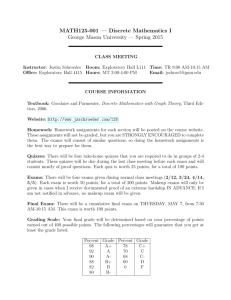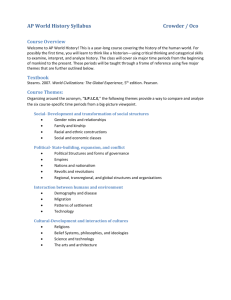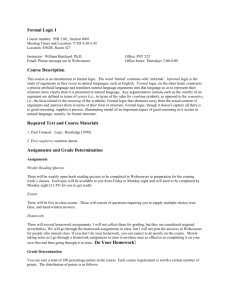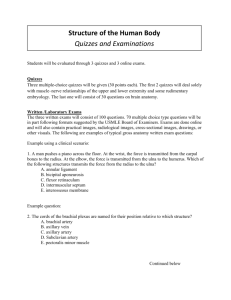PSY 344 (Section 201): Developmental Psychology
advertisement
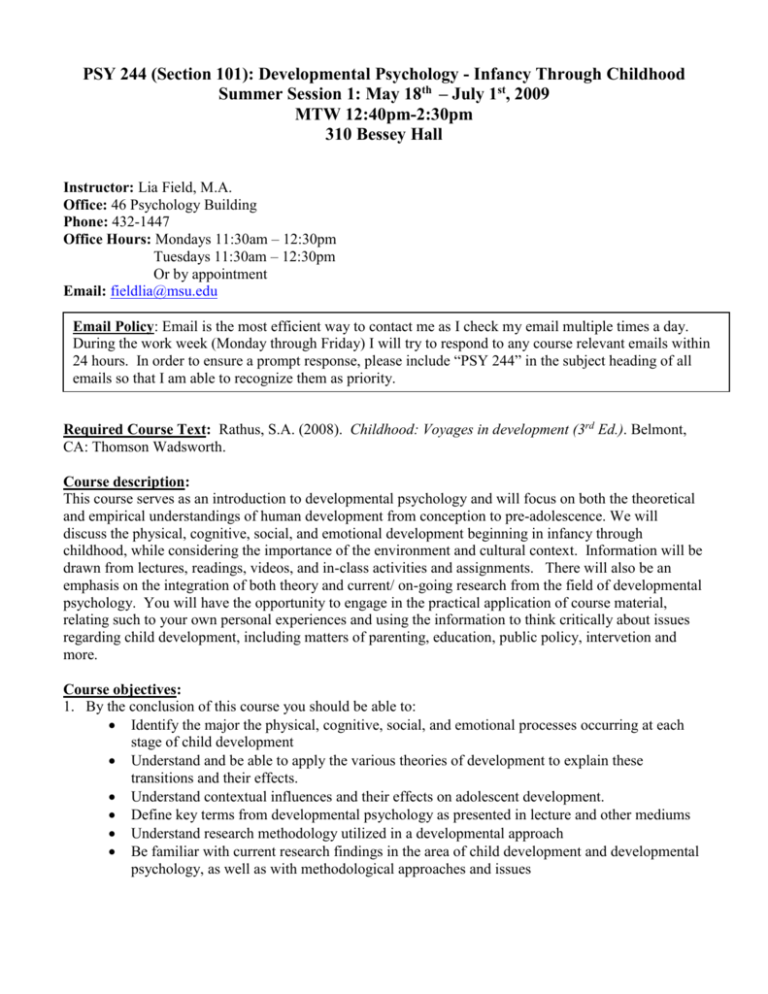
PSY 244 (Section 101): Developmental Psychology - Infancy Through Childhood Summer Session 1: May 18th – July 1st, 2009 MTW 12:40pm-2:30pm 310 Bessey Hall Instructor: Lia Field, M.A. Office: 46 Psychology Building Phone: 432-1447 Office Hours: Mondays 11:30am – 12:30pm Tuesdays 11:30am – 12:30pm Or by appointment Email: fieldlia@msu.edu Email Policy: Email is the most efficient way to contact me as I check my email multiple times a day. During the work week (Monday through Friday) I will try to respond to any course relevant emails within 24 hours. In order to ensure a prompt response, please include “PSY 244” in the subject heading of all emails so that I am able to recognize them as priority. Required Course Text: Rathus, S.A. (2008). Childhood: Voyages in development (3rd Ed.). Belmont, CA: Thomson Wadsworth. Course description: This course serves as an introduction to developmental psychology and will focus on both the theoretical and empirical understandings of human development from conception to pre-adolescence. We will discuss the physical, cognitive, social, and emotional development beginning in infancy through childhood, while considering the importance of the environment and cultural context. Information will be drawn from lectures, readings, videos, and in-class activities and assignments. There will also be an emphasis on the integration of both theory and current/ on-going research from the field of developmental psychology. You will have the opportunity to engage in the practical application of course material, relating such to your own personal experiences and using the information to think critically about issues regarding child development, including matters of parenting, education, public policy, intervetion and more. Course objectives: 1. By the conclusion of this course you should be able to: Identify the major the physical, cognitive, social, and emotional processes occurring at each stage of child development Understand and be able to apply the various theories of development to explain these transitions and their effects. Understand contextual influences and their effects on adolescent development. Define key terms from developmental psychology as presented in lecture and other mediums Understand research methodology utilized in a developmental approach Be familiar with current research findings in the area of child development and developmental psychology, as well as with methodological approaches and issues 2. On exams you will be asked to identify (through recognition or free recall) the: Theory/stage/transition that best describes a given example. Key feature of a developmental theory or concept. Definition that matches the key term Expectations: 1. We will meet three times a week on Mondays, Tuesdays, and Wednesdays, from 12:40pm to 2:30pm. We will have a break each day from 1:30pm to 1:40pm.You will be expected to attend class regularly and complete the assigned readings for the date listed. Although you will not be graded on attendance, short quizzes will be administered intermittently throughout the course of the semester at the conclusion of lecture (see below for more information). In order to perform well in the class grade-wise and to maximize the amount of knowledge you acquire from the course it is in your best interest to attend class daily. 2. Due to time constraints, we will not be discussing all of the chapters from the required text. As such, you will not be responsible for the material from the chapters we do not discuss unless specifically mentioned in class. In the reading list below, you will find which chapter topics you are responsible for reading and on which you will be tested. 3. We may not discuss all text topics in depth during class; therefore, it is important that you complete the readings as assigned in order to further your understanding of the material. **Although I may not cover a topic in detail in class, if I make special note of that topic (either in the powerpoint or in lecture) it is your responsibility to know that material for the exam** 4. You are encouraged to take an active role in your learning! Should you have questions about any of the material presented in the text or during lecture, please feel free to discuss those with me during lecture (if it is appropriate), during office hours, or via email. 5. You are expected to complete all exams when scheduled unless specific permission is given for you to do otherwise. (Details are below). 6. You are expected to complete all in-class assignments and activities as a part of your group work/ class participation. Behavioral Expectations: 1. You are expected to behave like mature college students while attending this class. This includes being attentive (not reading the newspaper, not using cell phones, not sleeping), not conversing loudly with neighbors, or being otherwise disruptive to your classmates or instructor. You may be asked to leave class if you persist in these behaviors. 2. Communication with the instructor via email or in person, and communication with other classmates during class discussion, small group discussion, etc. must be done in a respectful, mature and thoughtful way. In this class you are invited to ask questions and share your opinions, and it is expected that you will have a point of view that differs from others. While you may strongly disagree with some of the other opinions conveyed, the classroom is a place to express ideas without fear of retribution. Topics will be discussed in a scientific way, using evidence for and against various perspectives to allow each student to form his or her own opinion. Verbal abuse or attacks of fellow students will not be permitted during class discussions. Attendance: 1. Time is limited for this semester and there is an extensive amount of material to cover; therefore, attendance in class is essential to understanding and retaining the material. 2. You are expected to be in every class for the entire period; however, if you need to leave before the end of a class period, please inform me before class and leave quietly and respectfully (i.e. sit closer to the door that day instead of in the middle of the lecture hall). 3. Also, if you know that you are going to miss a class, please inform me as soon as possible preferably before the class you will be missing. 4. If you miss a class, you are responsible for contacting a classmate to copy the notes you missed. I will distribute the lecture slides at the start of each class but will NOT be posting them on Angel. STUDENT EVALUATION: Exams: 1. You will have 3 exams in this class (two midterms and a final). THEY WILL NOT BE CUMULATIVE - they will cover only the material presented since the previous exam. Both of the midterms and the final will be worth 100 points apiece. The first part of each exam will consist of 40 multiple choice questions (worth 2 point apiece). The second part of each exam will include a series of short answer questions worth 20 points altogether. You will have a number of short answer questions to choose from; therefore you will not have to answer all of them. Study Guides - A study guide will be provided to you at least one week prior to each exam. All relevant information that will be addressed on the exams will be included on the guides; however, certain material may be focused on in more detail than others, or be covered more extensively on exams. The study guides are provided as a way to help you focus on the information it is most important to be familiar with in order to perform well on the exams. 2. Make-up exams - You are expected to be here for exams on their scheduled days unless there is a documented (e.g., doctor’s note) emergency. You need to notify me of the emergency within 24 hours (i.e. – 24 hours before the exam if you know about the absence in advance, or 24 hours after in the case of unexpected illness or other emergency hours of the scheduled exam. Going on vacation is NOT considered a legitimate excuse for missing exams, regardless of advance notice. Should you have a legitimate, excused absence, the instructor will arrange with you an appropriate time to complete a make-up exam. Quizzes: 1. Short 5 – question quizzes (2 points per question) will be administered randomly throughout the session, and will be given during the last 10 minutes of lecture. The quizzes will only pertain to material from lecture that day (not from the textbook) and will be OPEN BOOK – you are allowed to refer back to your notes but you cannot consult with other members of the class, the work must be your own! Therefore it is in your best interest to be attentive during class and take thorough notes! Questions on the quizzes will not be exactly the same as the questions you will see on the exams; however they will be similar, for example matching key terms with definitions, identifying the theory that explains a particular transition, etc. These quizzes serve multiple purposes: Familiarizing you with the format of questions you will see on exams Familiarizing you with the material covered in lecture Encouraging class attendance 2. Throughout the duration of the session a total of 13 quizzes will be administered. The lowest three quiz grades will be dropped. Each quiz will be worth 10 points (with 10 quizzes contributing to your final grade = a total of 100 possible points). 3. Make-up quizzes will not be available. Missed quizzes due to class absence or leaving early will receive 0 points; however remember that your lowest three quiz grades will be dropped! Group Work/Participation: 1. During class you will have various opportunities to participate in small group discussions/activities utilizing material from both lecture and the text. Examples of possible group activities include generating examples of terms or concepts that we are learning in class, answering thought questions about video clips or short articles read in class, relating class concepts to personal experience, debates regarding “hot topics” in child development and developmental psychology, discussing relevant case studies, etc. 2. All students are expected to participate and contribute during small group discussions. I will be engaged with the groups in order to evaluate participation. Additionally you may be asked to turn in written answers or present a summary of the group discussion to the class, through which participation will be evaluated. Points from group work contribute to about 11% of your final grade (5 group activities at 10 points each = 50 possible points in total). 3. Class activities will not be held on the same day of quizzes so as not to double penalize students should they be absent from class that day. 4. If you are absent from class on a day that group discussions are held there will not be an opportunity to make up the missed work, however extra credit opportunities are available to help compensate for lost points (see below for more information on extra credit opportunities). Re-grade Policy: If you believe that there was an error in the grading of an exam or specific exam question, you may request a re-grade. Re-grade requests must be submitted in writing, within one week or receiving the original grade and must specify where or in what you believe the error was made. I will then review the request and respond to you in writing, letting you know whether I feel the re-grade is appropriate and why. I will always attempt to ensure that your exams are graded fairly and in accordance with grading criteria. Curving Policy: I do not intend to curve exam or final grades. When exam scores are release I review the scoring office report. If the scoring office report indicates that specific items did not discriminate well between students’ understanding of the material, or were too difficult, these items will be removed from the exam – an additional point will added to everyone’s exam score for each question removed. Although I do not intend to curve, I reserve the right to curve final course grades as appropriate. If such a decision is made the class will be notified through email. Extra Credit: There are multiple opportunities to receive up to 10 extra credit points (maximum) on your final grade in the event that you feel you need it: 1. Participation in the subject pool: 1 point of extra credit per 1 half-hour of participation in an experiment(s), with a maximum of 5 credits allowed. Documentation of the number of credits earned needs to be handed into me by Monday, June 29th in order to earn the extra credit on your final grade. You will not be penalized for not participating in subject pool activities. 2. Journal Article Abstract: I will give you a recent journal article relevant to issues discussed in the course. The title, journal name (and other identifying information) and abstract of the article will be removed. On your own time you will need to read the article, and come up with a title and an abstract of your own which demonstrate that you have read and have a thorough understanding of the article. More specific guidelines for writing the abstract will be provided to you should you wish to take part in this opportunity. You must request the article from the instructor and turn in the assignment before Monday, June 29th to receive credit. This assignment is worth a maximum of 10 points to be added to your final grade. 3. You can complete both extra credit opportunities for a total of 15 extra points to be added to your final grade. Mid-semester review: Halfway through the semester you will have the opportunity to offer formal feedback to me on your perception of how the class is progressing. If possible, I will use the information you give me in the second half of the semester to give you a more valuable learning experience focused on your needs. Please take these evaluations seriously and provide honest and constructive feedback. You are also welcome to give me informal feedback throughout the semester. **Important** Academic Honesty: Article 2.3.3 of the Academic Freedom Report States, “The student shares with the faculty the responsibility for maintaining the integrity of scholarship, grades, and professional standards.” In addition, the College of Social Sciences adheres to the policies of academic honesty specified in General Student Regulation 1.0, Protection of Scholarship and Grades; the all-University Policy on Integrity of Scholarship and Grades; and Ordinance 17.00, Examinations (See Spartan Life: Student Handbook and Resource Guide and/or the MSU website at www.msu.edu). **Cheating on any assignment listed above will not be tolerated in this class and may result in a failing grade on the assignment, for the course, or more severe action at a University level. Unethical practices may include, but are not limited to, looking at other students’ tests during exams, using notes or lecture materials during the exam, plagiarizing, completing assignments for other students, or posting test questions on websites such as AllMSU.com.** GRADES: Points (Total: 450 points) o Midterm Exam #1 = 100 points (22%) o Midterm Exam #2 = 100 points (22%) o Final Exam = 100 points (22%) o Quizzes = 100 points (22%) o Group Work =50 points (11%) o The final grade will be the total number of points earned, plus extra credit points earned, divided by the total number of points possible. Grade Ranges: Points 405+ 382.50 – 404.99 360 – 382.49 337.50 – 359.99 315 – 337.49 292.50 - 314.99 270 - 292.49 269.99 Percentage 90+ 85-89 80-84 75-79 70-74 65-69 60-64 59 or less Grade 4.0 3.5 3.0 2.5 2.0 1.5 1.0 0.0 Schedule (This schedule is subject to change): MODULE #1 – Beginnings and Infancy WEEK 1 ASSIGNMENTS Mon. 5/18 Tues. 5/19 Wed. 5/20 Introduction/Course overview History and Theories Read: pgs. 4 – 32 of text Methods Read: pg. 32 – end of chapter of text Research Methods with Children (Culberston, 1999) – will be handed out in prior class Heredity, Conception and Prenatal Development Read: All of Chapter 2 Chapter 3, pgs. 78 - 92 WEEK 2 ASSIGNMENTS Mon. 5/25 Tues. 5/26 Wed. 5/27 NO CLASS – CAMPUS CLOSED FOR MEMORIAL DAY Prenatal Development, Birth and the Newborn baby Read: Chapter 3, pgs. 93 – 104 All of Chapter 4 Infancy – Physical Development Read: Chapter 5 WEEK 3 ASSIGNMENTS Mon. 6/01 Tues. 6/02 Wed. 6/03 Infancy – Cognitive Development Read: Chapter 6 Infancy – Social and Emotional Development Read: Chapter 7 MIDTERM EXAM #1 MODULE #2 – Early Childhood Mon. 6/08 Tues. 6/09 Wed. 6/10 Video on Early Development No readings assigned Early Childhood – Physical Development Mid-term student course evaluations Read Chapter 8 Early Childhood – Cognitive Development Read: Chapter 9 WEEK 5 ASSIGNMENTS Mon. 6/15 Tues. 6/16 Wed. 6/17 Early Childhood - Social and Emotional Development Read: Chapter 10 Early Childhood – Social and Emotional Development Ctd. Read: Chapter 10 MIDTERM EXAM #2 MODULE #3 – Middle Childhood WEEK 6 ASSIGNMENTS Mon. 6/22 Tues. 6/23 Wed. 6/24 Middle Childhood – Physical Development Read: Chapter 11 Middle Childhood – Cognitive Development Read: Chapter 12 Middle Childhood – Social and Emotional Development Read: Chapter 13 WEEK 7 ASSIGNMENTS Mon. 6/29 Tues. 6/30 Wed. 7/01 Disorders Specific to Childhood Read: Handout to be distributed in prior class Video/Class Acitivity (content will be included on final exam) Q & A exam prep No readings assigned FINAL EXAM Complete final student evaluations





